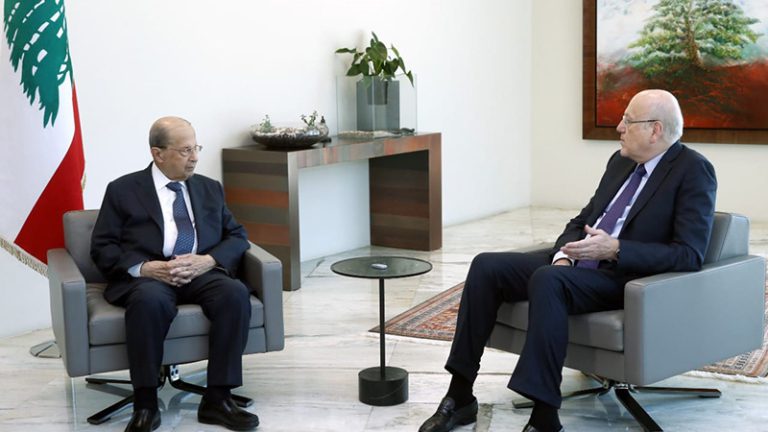
Najib Miqati, the billionaire tasked over a year ago with forming the Lebanese government, has finally finished putting it together, but not before President Michel Aoun sapped the last ounce of his energy and patience. While apparently denying the president his wish to have control over at least one-third of the new cabinet—which would have allowed him to set its agenda and threaten its fate—Miqati had to abandon his long sought-after goal of forming a government of technocrats unbeholden to entrenched political parties and interests. The trade may be a necessary mechanism for the two men to cooperate on addressing the very difficult economic and social conditions facing the country today.
Needless to say, the Miqati cabinet has to hit the ground running. The new prime minister was emotional when announcing the birth of his cabinet at a short news conference at the presidential palace in Baabda near Beirut. He actually tried to hold his tears as he was describing the dire daily circumstances confronting all Lebanese, including mothers not being able to secure enough baby formula for their infants and children unable to attend school. He promised that his new team will start right away with a rescue program to address urgent issues, but simultaneously announced that the government will cut subsidies because its coffers are empty, asking everyone for more sacrifice. By being blunt, Miqati is hoping that the Lebanese understand that he has no quick solutions, that they have to be extra patient, and that the whole country is in the same rickety boat until, and if, it reaches safety.
It is obviously premature to judge the possibilities of success for the new 24-member cabinet. While it is not a cabinet of former politicians—almost none of the ministers previously served in parliament or government—they have been chosen as representatives of political forces in the country. As such, and despite their task of addressing pressing socioeconomic conditions, they cannot be totally free of the influence of political bosses, no matter how discredited these have been. Miqati thus has the immediate responsibility to limit such influence and distance his team from the general atmosphere of disunity and discord. To be sure, if he is to succeed in addressing the dire conditions he fears, Miqati must quickly enforce his writ on his ministers and try to keep them away from narrow political considerations and factional interests.
The new government’s immediate task is to put together a reform program that charts a way to address the rampant corruption in the political system, the bureaucracy, and the economy. Lebanon’s road to recovery must start with a plan that convinces the International Monetary Fund, the World Bank, and other regional and international lenders that the country is serious about addressing past malfeasance and reforming its economic infrastructure. Lebanon can no longer live solely on its reputation as a financial and services center and a tourist attraction. Just as regional states’ economies must diversify away from their reliance on hydrocarbons, Lebanon must add to its forte sustainable and productive economic activities such as agriculture and industry. The country has a capable and knowledgeable work force that seeks employment outside of its borders. To be sure, when and if outside assistance comes, it should be directed toward developing new pillars of Lebanon’s economy that can absorb new and able talent; only then can the economy become sustainable.
Miqati and his cabinet must also begin preparing for important local, parliamentary, and presidential elections in 2022. The new prime minister asserted that his government will stick to the constitutionally mandated polls next May. The elections for president are set for the end of the following October. At present, there is much disparagement of the electoral law that governed the 2018 parliamentary elections. It is hard to see how Miqati will be able to make changes in that law, even if he wanted to do that. That is why disaffected voters and political forces harmed by it will have to devise ways to build new coalitions to be able to surmount built-in obstacles. But the state of non-confidence in the political system and the current coterie of politicians may be their best hope to be able to score important gains in parliament.
Lebanon has waited for an effective government since the autumn of 2019. Then, the beginning of the current state of economic and social collapse drove hundreds of thousands of demonstrators into the streets, forcing the resignation of then-Prime Minister Saad Hariri and his cabinet. The current caretaker government of Prime Minister Hassan Diab—that took over at the beginning of 2020 and resigned following the August 4th explosion at the Port of Beirut-has failed to address any of the problems that suddenly surfaced in 2019. Conditions for success in that task are now much more difficult, giving pause to any hope that Miqati will have better luck. Considering that, constitutionally, his government has only a short mandate until the next parliamentary elections in May, Miqati truly has to hit the ground running. No rest for the weary.

